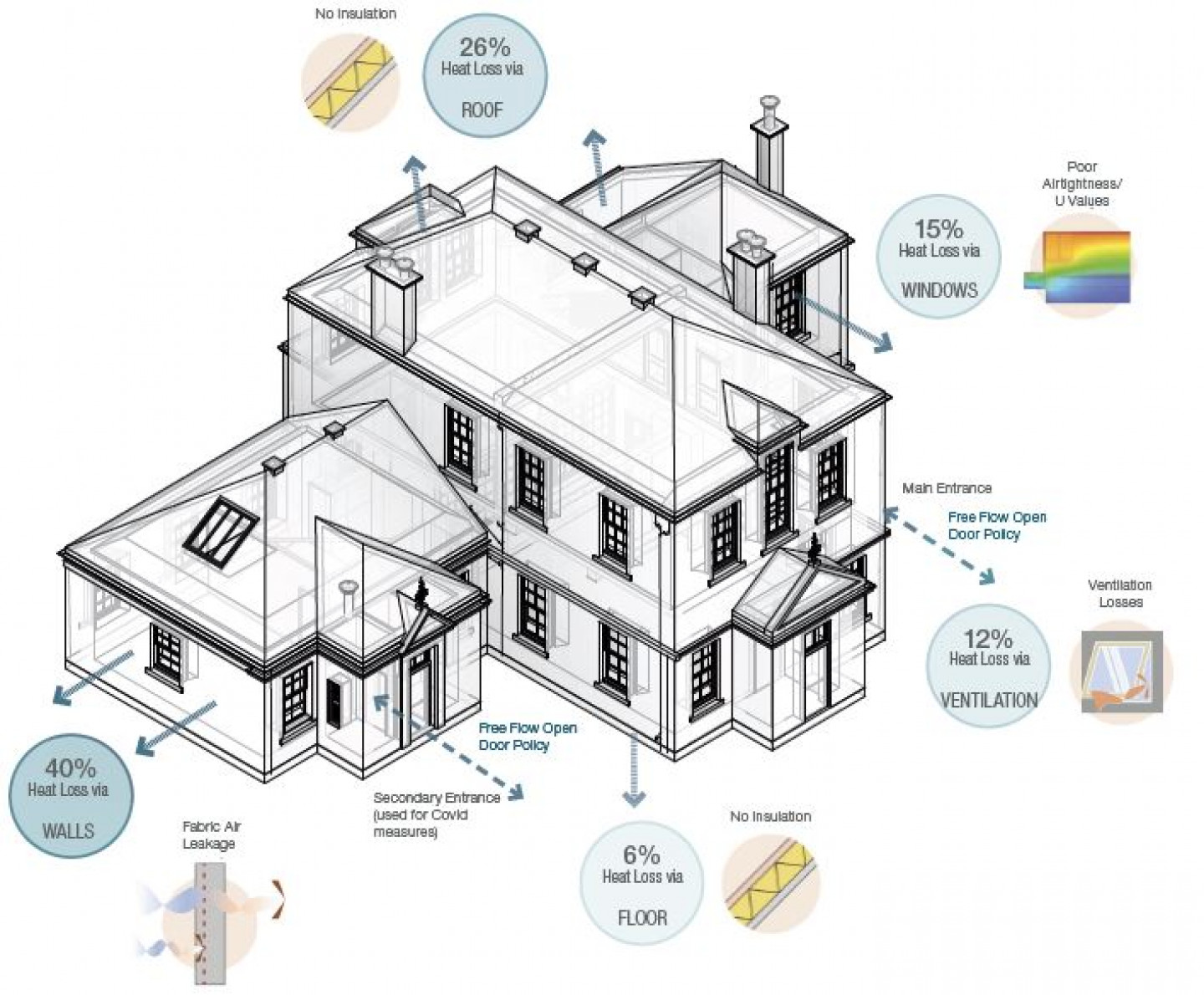The potential of understanding data in retrofitting
Building managers are increasingly quantifying aspects of building performance, particularly thermal performance, airtightness and air quality, and occupant feedback. But there are still opportunities for this understanding to inform technical retrofit decisions, optimise occupants’ experience, health and wellbeing, and generate financial gains.
Research into building performance has played a vital part in decarbonising the UK’s built environment. Academic studies exposed the shortfall in energy efficiency between designs and performance as-built.
Then extensive studies, including those funded by the then Technology Strategy Board (now Innovate UK), found a widespread (and sometimes sizeable) mismatch between expectations of building’s energy use and reality. This ‘performance gap’ remains a challenge in lowering buildings’ carbon emissions and running costs, and improving energy security. Other performance issues revealed by research include poor air quality, moisture risk and low occupant satisfaction.
Assessment of building performance will help to solve this. Testing can highlight problems and allow remedial action, and offer quality assurance. Ongoing monitoring of a building’s performance can inform maintenance and ensure sustained good performance. And learning from data can inform the design process to improve future projects.
More readily usable testing techniques will bring building performance evaluation into general practice. Fifteen years ago, testing was invasive, costly and temperamental. Now, testing kits and services are readily available, as are affordable sensors, that measure thermal performance, air tightness and indoor air quality either on a one-off or ongoing basis. Innovate UK is funding several projects that will enable rapid assessment of building fabric performance.
Performance data is powerful when it is robust, repeatable, comparable and reusable through the lifetime of a building and across projects. Recognising the potential of standardised data, UK Research and Innovation (UKRI) funded the Building Performance Network to manage the writing and publication of the British Standard for in-use building performance evaluation (BS 40101).
Identifying opportunities
With around 30% of UK carbon emissions coming from buildings, decarbonising premises is an important step. This often involves significant investment and disruption – and sometimes resistance to action. Fortunately, data – and an increasing number of services and tools – can assist in this process.
Standardised and shared data will unlock new possibilities. Coupled with increasingly sophisticated machine learning, massive datasets can be transformed into evidence-based route maps to net zero. For example, aggregating decarbonisation activities could make a difficult project easier or balance areas with relatively low energy efficiency with renewable energy generation elsewhere on an estate.
Heat networks and local virtual power grids both depend on balancing supply and demand across multiple users and generators. Having a comprehensive picture of a neighbourhood will reveal where opportunities lie. Creating a scheme with a mixture of building types, including those with significant demand loads such as schools or leisure centres, could catalyse neighbourhood-wide decarbonisation. Quality data makes all of this possible.
Routes to decarbonisation
An evaluation of building stock is the starting point for decarbonisation. This includes testing buildings’ physical characteristics, and collecting the views of building occupants and monitoring internal conditions to identify areas of concern, along with any other key considerations for estate managers. Emerging technologies and standardised data inputs enable data science and machine learning to analyse otherwise unwieldy datasets to identify the opportunities and challenges to improve a building’s energy efficiency and other priority areas.
Engage relevant stakeholders
For many organisations responsible for decarbonising a building portfolio, engagement with internal and external stakeholders is vital. Data and its careful presentation can support this.
Finding the right way to improve the building stock, taking into account all stakeholders, often requires not only technical options but also an understanding of the financial and logistical opportunities. Overlaying data around fuel poverty, local infrastructure (such as substations) and funding opportunities can support retrofit prioritisation. Machine learning decision-making tools make this analysis increasingly straightforward.
Give confidence to building owners
Proven performance is powerful in discussing retrofit with building owners. Architectural firm Architype uses BS 40101, plus their building performance experience, to gain detailed understanding of both buildings and their users and communicate evidence-based proposals to clients. Conducting ongoing testing beyond building handover provides a chance to understand what still works and what needs tweaking.
Adopting a learning culture
Collecting data across the life of a project and across numerous projects fosters a culture of learning to assess what has worked well and reflect on what has not met expectations. Armed with good quality data and the right interpretative tools, as well as sharing lessons across the sector and with investors and communities, provides opportunities to create a timely and affordable net zero built environment as well as other benefits.

By Dr Laura Forster, Innovation Lead – Net Zero Heat, Innovate UK
Innovate UK is the UK’s national innovation agency, supporting business-led innovation in all sectors, technologies and UK regions.
https://www.ukri.org/councils/innovate-uk/
For more on the Innovate UK Net Zero Heat programme: https://iuk.ktn-uk.org/programme/net-zero-heat/



